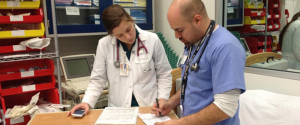 `If you’re looking into advancing your nursing career, you might be curious to learn more about the Doctor of Nursing Practice (DNP). This is a doctoral level nursing degree that some schools offer and which has been recommended by the American Association of Colleges of Nursing (AACN) as the standard entry level degree for advanced practice registered nurses (APRNs). Although some APRNs now work toward the DNP, many others still work toward a master’s level degree instead. Although many advantages of the DNP have been cited, the transition from master’s to doctoral degree as the entry level for APRNs has not been universally accepted or implemented.
`If you’re looking into advancing your nursing career, you might be curious to learn more about the Doctor of Nursing Practice (DNP). This is a doctoral level nursing degree that some schools offer and which has been recommended by the American Association of Colleges of Nursing (AACN) as the standard entry level degree for advanced practice registered nurses (APRNs). Although some APRNs now work toward the DNP, many others still work toward a master’s level degree instead. Although many advantages of the DNP have been cited, the transition from master’s to doctoral degree as the entry level for APRNs has not been universally accepted or implemented.
A Respected Degree
No one is saying that the typical master’s level degree for APRNs is not rigorous. In fact, part of the reason that the DNP was developed was in recognition of the fact that many nurses who go on to get a master’s level degree are putting in time and effort that is comparable to a doctorate in other disciplines. Many healthcare disciplines, such as audiology, dentistry, or physical therapy, have a practical doctorate degree already. It was thought that the development of a similar practice doctorate for nursing would help nursing stay abreast of those other fields and would provide nurses with the professional recognition they deserve. It might also draw more nursing students if they knew that they would be awarded a higher degree for their rigorous years of study. If you’re going to put in a similar amount of credit hours as students in other professions, it makes sense to be comparably recognized.
A Degree That Helps Prepare Specialists
The nursing profession already had research doctorates, so it made sense to begin to develop a practical one, especially to help meet demands in the current healthcare climate. Many APRNs work in primary care. They need to be well trained leaders. A DNP degree can offer nursing students the change to advance their skills in areas such as pharmacology, physical assessment and diagnostics. DNP students learn about health care policy and about ways to work with other health professionals. They are also given opportunities to pull together a final project synthesizing what they’ve learned. The rigors of the program help prepare nurses to specialize and care effectively for patient communities.
Related Resource: Become an ICU Nurse
Although state boards have not yet proceeded to adopt the DNP as the entry level degree for APRNs, the popularity of the DNP seems to be growing. According to the AACN, there are 264 active DNP program with another 60 programs in the works. Programs can now be found in 48 different states as well as Washington, D.C. There was an increase of almost 4,000 DNP students between the years 2013 and 2014. Given the increasing demands on nurses in the U.S., and the growing need for nurses to be skilled leaders in primary care, it would not be surprising if DNP programs continued to grow, even as master’s programs continue to do an excellent job in preparing advanced practice nurses. If you are looking into advance practice nursing, you may want to explore more about the Doctor of Nursing Practice degree.